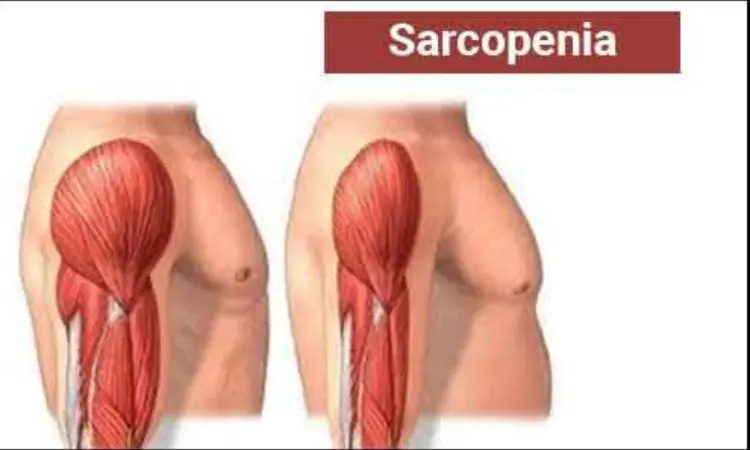- Home
- Medical news & Guidelines
- Anesthesiology
- Cardiology and CTVS
- Critical Care
- Dentistry
- Dermatology
- Diabetes and Endocrinology
- ENT
- Gastroenterology
- Medicine
- Nephrology
- Neurology
- Obstretics-Gynaecology
- Oncology
- Ophthalmology
- Orthopaedics
- Pediatrics-Neonatology
- Psychiatry
- Pulmonology
- Radiology
- Surgery
- Urology
- Laboratory Medicine
- Diet
- Nursing
- Paramedical
- Physiotherapy
- Health news
- Fact Check
- Bone Health Fact Check
- Brain Health Fact Check
- Cancer Related Fact Check
- Child Care Fact Check
- Dental and oral health fact check
- Diabetes and metabolic health fact check
- Diet and Nutrition Fact Check
- Eye and ENT Care Fact Check
- Fitness fact check
- Gut health fact check
- Heart health fact check
- Kidney health fact check
- Medical education fact check
- Men's health fact check
- Respiratory fact check
- Skin and hair care fact check
- Vaccine and Immunization fact check
- Women's health fact check
- AYUSH
- State News
- Andaman and Nicobar Islands
- Andhra Pradesh
- Arunachal Pradesh
- Assam
- Bihar
- Chandigarh
- Chattisgarh
- Dadra and Nagar Haveli
- Daman and Diu
- Delhi
- Goa
- Gujarat
- Haryana
- Himachal Pradesh
- Jammu & Kashmir
- Jharkhand
- Karnataka
- Kerala
- Ladakh
- Lakshadweep
- Madhya Pradesh
- Maharashtra
- Manipur
- Meghalaya
- Mizoram
- Nagaland
- Odisha
- Puducherry
- Punjab
- Rajasthan
- Sikkim
- Tamil Nadu
- Telangana
- Tripura
- Uttar Pradesh
- Uttrakhand
- West Bengal
- Medical Education
- Industry
Sarcopenia Emerges as Strong Predictor of Mortality in Cardiovascular-Kidney-Metabolic Syndrome: Study

Iran: A new study has identified sarcopenia-characterized by low skeletal muscle mass-as a significant predictor of disease progression and mortality among individuals with cardiovascular-kidney-metabolic (CKM) syndrome.
The research, published in BMC’s Diabetology & Metabolic Syndrome by Diar Zooravar from the School of Medicine, Iran University of Medical Sciences, Tehran, emphasizes the crucial role of muscle health in influencing outcomes in this complex, interlinked condition.
CKM syndrome represents a convergence of cardiovascular, renal, and metabolic dysfunctions, posing a growing global health burden. While sarcopenia has long been linked to adverse outcomes in chronic diseases, its specific role in CKM syndrome has remained unclear. This study aimed to clarify that relationship by evaluating the connection between sarcopenia, CKM stage severity, and the risk of death.
The analysis included data from 5,925 adults aged 20 years and older, gathered from eight cycles of the U.S. National Health and Nutrition Examination Survey (NHANES) between 1999 and 2018. Sarcopenia was determined using the Foundation for the National Institutes of Health (FNIH) criteria based on DXA-derived muscle mass, while CKM stages were classified using the American Heart Association’s framework. Statistical models were used to explore the association between sarcopenia and disease stage, as well as its impact on all-cause and cause-specific mortality.
The key findings of the analysis were as follows:
- The study followed participants for an average of around 10 years.
- Individuals with sarcopenia were found to be significantly more likely to have advanced stages of cardiovascular-kidney-metabolic (CKM) syndrome.
- Compared with those in stage 1, the odds of having advanced CKM disease were 2.23 times higher in individuals with sarcopenia.
- The odds were 3.33 times higher for stage 3 and 3.49 times higher for stage 4.
- Sarcopenia was also linked to an increased risk of death across all causes.
- Individuals with sarcopenia had a 52% higher risk of all-cause mortality.
- Cardiovascular mortality was 90% higher among those with sarcopenia.
- Non-cardiovascular mortality was 40% higher in individuals with sarcopenia.
These results highlight sarcopenia as not just a secondary complication but a core component of CKM progression. According to the author, early identification and management of low muscle mass could be vital in reducing disease advancement and improving survival in affected individuals.
However, the study acknowledged some limitations. Sarcopenia was defined solely based on muscle mass, without accounting for muscle strength or physical performance measures such as handgrip strength and gait speed—parameters now recommended in updated diagnostic guidelines. Furthermore, as the research was observational, causal relationships cannot be definitively established, and residual confounding factors, including variations in physical activity, cannot be ruled out.
The author emphasized the need for interventional studies to determine whether enhancing muscle mass and function could alter the course of CKM syndrome. Future trials incorporating resistance training, nutritional interventions, and anti-inflammatory strategies may help establish whether muscle-targeted therapies can reduce mortality and disease progression.
"The study positions sarcopenia as a key marker and modifiable target in CKM syndrome. Incorporating muscle health into risk prediction and management frameworks could pave the way for earlier interventions and improved outcomes in this high-risk population," the author concluded.
Reference:
Zooravar, D. Sarcopenia (defined by low muscle mass) as a predictor of disease progression and mortality in cardiovascular-kidney-metabolic syndrome. Diabetol Metab Syndr 17, 391 (2025). https://doi.org/10.1186/s13098-025-01943-x
Dr Kamal Kant Kohli-MBBS, DTCD- a chest specialist with more than 30 years of practice and a flair for writing clinical articles, Dr Kamal Kant Kohli joined Medical Dialogues as a Chief Editor of Medical News. Besides writing articles, as an editor, he proofreads and verifies all the medical content published on Medical Dialogues including those coming from journals, studies,medical conferences,guidelines etc. Email: drkohli@medicaldialogues.in. Contact no. 011-43720751
Next Story


